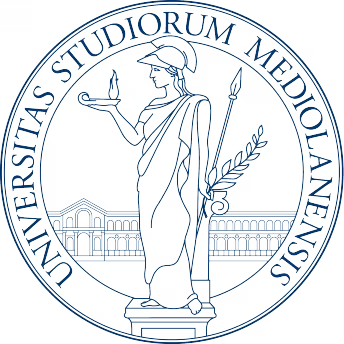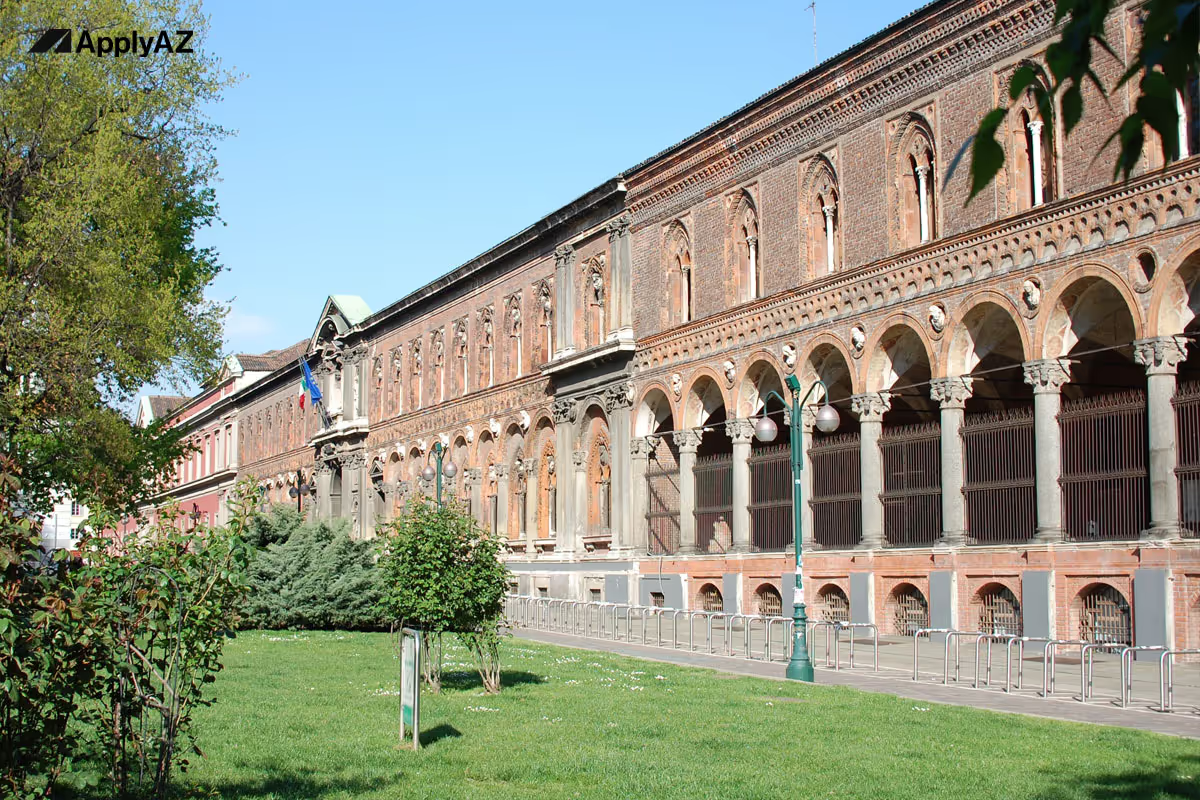Heading
Heading








University of Milan
English‑taught programs in Italy: breadth and quality
Founded in 1924, the University of Milan is a flagship among public Italian universities. It offers more than 15 full degrees entirely in English across life sciences, data science, economics, law, and the humanities. Small‑group seminars, modern laboratories, and research‑led teaching earn the university a consistent place in global top‑200 rankings for medicine, biology, and physics. Academic life blends lectures with project work and Erasmus+ exchanges, giving you both depth and international exposure.
Life in Milan: culture, costs, connections
Milan pairs Renaissance architecture with Europe’s fastest‑growing innovation district. Four metro lines, trams, and regional trains keep average commutes under 35 minutes, while student passes cut transport costs by half. Cafés stay open late for study sessions; world‑class music, design fairs, and football derbies fill weekends. Rents start around €400 per month in shared flats—pricey for Italy, but offset by campus dining at €4 per meal and the chance to share expenses with classmates.
Funding advantages: DSU grant and other support
As a state institution, Milan charges income‑linked tuition that ranges from €156 to roughly €3 000 per year. International students can apply for the DSU grant, which may waive tuition entirely and add a €7 000 living allowance, residence‑hall place, and meal vouchers. Merit scholarships reward top GPAs, and research assistant roles provide paid experience. With these tools, many graduates finish their master’s with little or no debt, mirroring the affordability of tuition‑free universities Italy promotes.
Career gateways in a global city
Milan is home to Italy’s stock exchange and to headquarters of companies such as IBM, Luxottica, and Nestlé. University partnerships cover more than 4 000 firms, feeding internships in finance, biotech, fashion tech, and AI start‑ups. Career Services run résumé labs, mock interviews, and on‑campus job fairs; 87 % of international graduates secure work or PhD places within seven months. Language tandems, alumni mentoring, and professional certification courses (Prince2, CFA Level I, Lean Six Sigma) further boost employability.
Five key takeaways
- Wide portfolio of English degrees backed by strong research.
- Dynamic metropolitan lifestyle with rich art and sport.
- Income‑based fees plus DSU grant make study highly affordable.
- Direct pipelines to internships and high‑growth careers.
- Supportive campus: libraries until midnight, 100+ clubs, free fitness classes.
In two minutes we’ll confirm whether you meet the basic entry rules for tuition‑free, English‑taught degrees in Italy. We’ll then quickly see if we still have space for you this month. If so, you’ll get a personalised offer. Accept it, and our experts hand‑craft a shortlist of majors that fit your grades, goals, and career plans. Upload your documents once; we submit every university and scholarship application, line up multiple admission letters, and guide you through the visa process—backed by our admission‑and‑scholarship guarantee.
Crops and Plant Sciences – LM‑69
Choosing one of the many English‑taught programs in Italy lets you study in Italy in English, pay moderate tuition at public Italian universities, and apply for generous support such as the DSU grant. The LM‑69 Master’s in Crops and Plant Sciences at University of Milan (Università degli Studi di Milano) equips you to secure food systems, improve sustainability, and lead innovation across the bioeconomy.
Why Pick This English‑Taught Programme?
Global agriculture must feed ten billion people while cutting emissions and conserving biodiversity. Skilled plant scientists are vital. By joining this course, you will:
- Learn modern breeding, precision farming, and climate‑smart agronomy.
- Collaborate in an international classroom that mirrors global supply chains.
- Benefit from affordable fees and scholarships for international students in Italy.
- Access green start‑ups, EU research projects, and worldwide agrifood networks.
Programme Snapshot
Duration: Two years (120 ECTS)
Language: Entirely English
Focus areas: Crop genetics, soil science, sustainable agronomy, data analytics
Learning style: Lectures, lab sessions, field trials, industry projects
Outcome: Expertise to innovate crops, advise policymakers, or pursue PhD research
Core Learning Goals
- Integrate biology and technology—from gene editing to remote sensing.
- Diagnose plant–environment interactions—water, soil, and climate stress.
- Optimise cropping systems for yield, quality, and ecological health.
- Analyse data with R, Python, and GIS for evidence‑based decisions.
- Communicate science to farmers, firms, and global institutions.
Curriculum Overview
Year 1: Foundations and Methods
- Plant Physiology and Biochemistry
- Genetics and Genomics for Crop Improvement
- Soil Science and Nutrient Management
- Statistics and Experimental Design using R
- Agricultural Ecology and Biodiversity
- Research Skills Workshop (literature reviews, grant writing)
Year 2: Application and Innovation
- Precision Agriculture and Remote Sensing
- Climate‑Smart Agronomy (drought, heat, and salinity adaptation)
- Integrated Pest and Disease Management
- Seed Technology and Post‑Harvest Quality
- Elective Cluster—choose plant biotechnology, organic farming, or agri‑business economics
- Thesis or Internship—six months with a university lab, breeding company, or NGO
Teaching Approach: Hands‑On Science
- Field trials—monitor crop plots, drones, and IoT sensors to collect real‑time data.
- Lab rotations—conduct PCR, molecular markers, and tissue culture.
- Case studies—evaluate regenerative farming or vertical‑farm business plans.
- Industry panels—meet agritech start‑ups and multinational seed firms.
- Group projects—design resilient cropping systems for varied climates.
Skills You Will Gain
- Breeding strategies—select markers, run genomic prediction, assess diversity.
- Data analytics—model yields, map variability, and visualise trends.
- Sustainability metrics—calculate carbon footprints and ecosystem services.
- Project management—budget trials, manage teams, and report milestones.
- Science communication—translate research into extension guides and policy briefs.
Studying at a Public Italian University
The University of Milan is a flagship among public Italian universities, offering:
- Research facilities—greenhouses, phenotyping platforms, and genomics labs.
- EU projects—access to Horizon Europe consortia on sustainable crops.
- Career services—internship matchmaking, CV clinics, and start‑up incubators.
- Cultural life—seminars, language exchanges, and sustainability clubs.
All teaching staff are active researchers who publish in leading agronomy and genetics journals.
Funding: DSU Grant and Additional Support
DSU grant perks
- Significant or total tuition reduction
- Low‑cost dorms or rent subsidies
- Meal vouchers for campus dining
- Allowances for books and local travel
How to secure funding
Submit family income certificates (translated if needed) and meet application deadlines. ApplyAZ provides templates, reminders, and document checks. Merit scholarships and Erasmus+ grants can further cut costs or fund a research stay abroad.
Admission Process
- Eligibility—Bachelor’s in agronomy, biology, biotechnology, or related fields.
- English proof—IELTS, TOEFL, or equivalent at B2 level.
- Documents—CV, transcripts, passport, motivation letter, and two references.
- Online application—portal opens each spring; early submission recommended.
- Interview (if required)—discuss lab experience, fieldwork, and goals.
- DSU application—collect financial proofs and submit before regional deadlines.
- Visa & arrival—obtain embassy appointment, arrange housing, attend orientation.
Student Life and Professional Networking
- Agri‑tech hackathons—develop sensor tools for nutrient monitoring.
- Farm visits—tour organic vineyards, rice paddies, and seed companies.
- Green start‑up incubator—pitch eco‑fertiliser innovations or crop‑monitoring apps.
- Language cafés—practise Italian while sharing international recipes.
- Weekend getaways—hike Alpine trails or explore Mediterranean landscapes.
These experiences build soft skills and lasting networks across the agrifood sector.
Maximising Scholarships for International Students in Italy
- Start document translations early—official seals can take weeks.
- Draft a clear cost‑of‑living budget in your DSU application.
- Highlight volunteer or leadership roles; many funds value community impact.
- Stay ahead with ApplyAZ’s timeline reminders—no missed deadlines, no lost funding.
Long‑Term Value of the LM‑69 Degree
- Future‑proof skills—sustainable crop science is central to food security and climate goals.
- European recognition—a Bologna‑aligned master’s eases mobility across EU jobs and PhDs.
- Global network—classmates and professors connect you to projects worldwide.
- Innovation mindset—coursework bridges lab genes and on‑farm realities.
- Ethical grounding—training highlights biodiversity, equity, and responsible tech.
You graduate ready to shape resilient food systems and green value chains.
Ready for this programme?
If you qualify and we still have a spot this month, we’ll reserve your place with ApplyAZ. Our team will tailor a set of best-fit majors—including this course—and handle every form and deadline for you. One upload, many applications, guaranteed offers, DSU grant support, and visa coaching: that’s the ApplyAZ promise. Start now and secure your spot before this month’s intake fills up.

They Began right where you are










